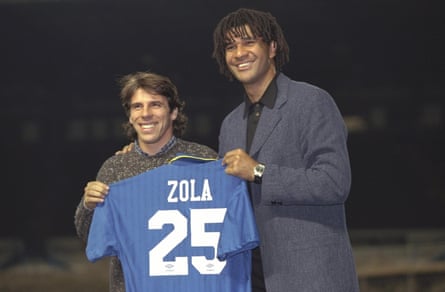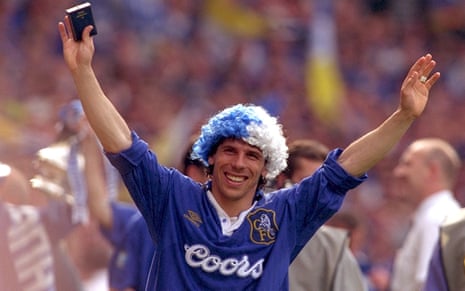David James was not the first goalkeeper to feel this way. Picking himself up from the Stamford Bridge turf, he looked around to see the ball nestled in the net behind him. Moments earlier, there did not appear to be any imminent danger of conceding. There was a forest of players between the Liverpool goalkeeper and the ball as Gianfranco Zola rolled it out of his feet 25 yards out. It was the Italian’s second touch that was so devastating, a sweep of his left foot that managed to swerve the ball past the crowd in front of him and beyond an outstretched James.
“It was just a freaky goal because at the time I thought, ‘how’s it gone in?’,” says James of Zola’s goal in the FA Cup tie between Chelsea and Liverpool in early 1997. “It wasn’t until watching it on replays that I saw I couldn’t have done anything about it because I’m diving in the right place for where the shot started. But by the time it goes in the back of the net, I’m already 100% committed.”
Zola’s goal was the second in Chelsea’s fightback from 2-0 down to win 4-2. Their stirring second-half display lit up a dreary January afternoon for millions watching live on the BBC. For many, it was their first chance to see the Chelsea’s new recruit in action for a full 90 minutes, having signed two months earlier from Parma. By the time he bid the Premier League goodbye more than six years later, he had become one of the greats.
When Zola joined Ruud Gullit’s side in November 1996, there was not much fanfare. At the time, there wasn’t anywhere near the same knowledge of the European leagues and, while signing an Italian playmaker with a big reputation didn’t go unnoticed, not many fans – or players – knew quite how good he was. “Zola may well have been a great player before he went to Chelsea, but I wasn’t aware of that,” says James. “He might have had a pedigree before that, and I’m sure Chelsea fans would say they always knew he was a superstar, but I wasn’t one of the people who knew that.”

Within months, the twinkle-toed genius had left people in little doubt. Word travelled fast, but it wasn’t until opposition players experienced his brilliance in the flesh that they realised quite how much magic was laced in his boots. “He was one of those players we’d earmarked as a danger,” says West Ham midfielder John Moncur. “But no one in the team realised what a talent he was until after the game. You only get that when you actually play against someone.
“It was not only his football intelligence. It was his changing of direction, his awareness. I looked at him and thought he was only small, but he had everything – apart from winning headers. He had intelligence, decision-making. When he had the ball, he had a low centre of gravity and he’d twist and turn you, and it was something that was foreign to us. You didn’t come up against those players every day in training.”
West Ham at home was Zola’s sixth Premier League match and Moncur recalls him being earmarked as one of Chelsea’s biggest threats by then-boss Harry Redknapp. Without the data and video footage managers have to call upon now, the initial plan had been to simply double up on him to stifle his influence on the game. That proved futile, as Zola put on a masterclass in a 3-1 win – providing a deft flick to tee up Mark Hughes for the first goal, then scoring a second that is still sung about by Blues fans today.
As the game approached the 10th minute, Zola escaped the attentions of his markers to isolate Hammers defender Julian Dicks, twisting the left back round like he was riding on a corkscrew before rifling past Ludek Miklosko to make it 2-0. “If somebody of his quality is on fire like he was that day, there’s not a lot you can do really,” says Moncur. “Dicksy was a great player in his own right and he wouldn’t admit it, but even after that game and that goal, there’s certain players you come up against in your career – very rarely – who can things like Zola could do.
“We all sat down afterwards, and you have to hold your hands up and say ‘what could we have done any different’. When you’ve got a genius at the top of his game, you can try most things but you can’t stop him.”
Zola’s first Chelsea goal had arrived a few weeks earlier in a match against Everton. “We had a masterplan of how to deal with his free-kicks,” remembers Everton defender Earl Barrett, who won three caps for England. “We practised it in training that as soon as he had a free-kick on the edge of the box, it was obviously dangerous because of his quality. So my job was to stand on the backline but not with the goalkeeper because the strikers can come and stand with me. So I stood near the wall and just before he takes it, I’ll back off and protect the post.
“Just before he took it, I backed off and went to the guard the post and he still hit it in – right over the top of my head. You think ‘wow’. That was our plan. I could jump relatively high, but he must have hit it on a postage stamp. We couldn’t deal with his quality. You think ‘what the hell do we do about that’ – that was our plan and it failed miserably.”
Zola he went on to score 12 direct free-kicks in the Premier League – leaving him behind just David Beckham in the competition’s all-time rankings. But he was not just deadly from a dead ball. “When people talk about the knuckleball, Zola had it in normal play,” says James. “The goal he scored, I remember diving full stretch for it and while my arm was extended, it kind of twisted off into the corner.”

Goalscoring was not even his main asset. His creativity and speed of thought meant he would ghost into seemingly innocuous areas of the pitch before unleashing a defence-splitting pass for a teammate. “It was his ability to get other people into a position to score goals,” says James. “His ability to take players on, find other players, they’re the players you worry about more.
“It’s an apt parallel, but if you look at Thierry Henry, he was the scary striker – the one who could shoot from anywhere, run past anyone and was an individual. With Zola from that midfield position, he was just pretty much in control of the game, which meant he could pass to the forwards.
“He could score goals but, even in today’s game, if you’re looking at the best players, they’re the ones who can pick the lock to use an old football cliche. He had that sort of skill, that awareness, that vision in abundance. When you have everything at such high level as he did, it makes you one of the worst players to play against.”
Barrett and Moncur agree, but both point out that it was the arrival of players like Zola in the 1990s that helped to increase the standard of England’s top flight. Rising tides raise all ships. “Young players or old players, you learn most things from your disappointments,” explains Moncur. “A day like when you get beaten in a local derby and get absolutely beaten by an individual, you will learn – and you don’t want that to happen again. You learn by nullifying someone and it probably made players better because you learn from the opposition as well, not only from your own teammates.”
With the benefit of hindsight, Moncur’s opinion rings true. But at that time – especially for a club competing for honours or at the higher echelons of the league – James says the arrival of that mercurial talent among your rivals’ ranks carries a different emotion. One that means players are casting envious glances elsewhere.
“It’s more frustration than anything else,” James adds. “Back then it was an open transfer window until the last month of the season, so you establish your friendship groups within the club. “Then you’ll see someone like Zola at another club – not so much when he signs, but when they start doing stuff – and you look around your team and think ‘perhaps we need something else’. But you’ve also got your friendship circles and it’s ‘who would you get rid of to get someone else in’ and ‘why aren’t we going out to buy them?’. That could be a different maker for, say, Chelsea to catch the group or try to put themselves in a position to win the league.”
Zola helped Chelsea to win the FA Cup in his first season and became the only footballer in history to win the football writers’ player of the year award without playing a full season in English football. The award had been around for 50 years but he was the first Chelsea player to win it. Zola was a difference maker and he is still revered for his impact, 25 years on.

Comments (…)
Sign in or create your Guardian account to join the discussion